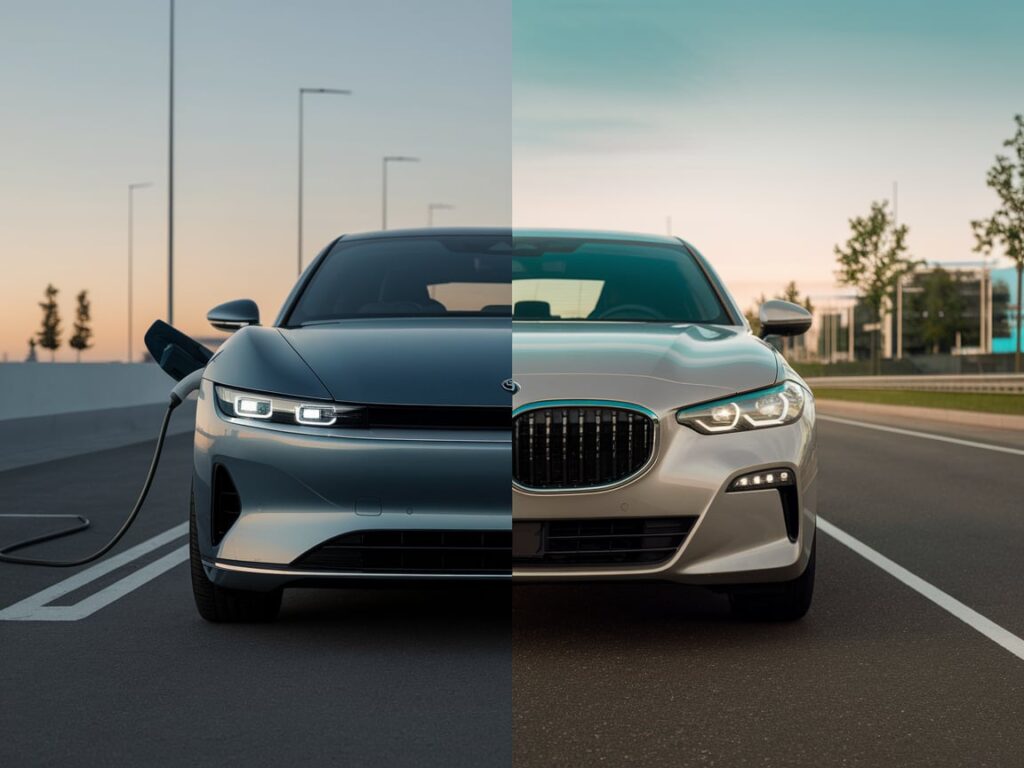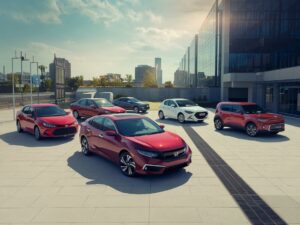Nowadays we have two types of cars One is Hybrid and another is Electric, But Which one is Best Let’s see

Electric car :
An electric car is a vehicle that runs primarily or entirely on electricity, rather than using a traditional internal combustion engine powered by gasoline or diesel. Electric cars use an electric motor powered by energy stored in rechargeable batteries.
Key Features of Electric Cars:
1) Battery-Powered: The energy source is a battery that can be charged using electricity from the grid or other renewable sources.
2) Zero Emissions: Electric cars do not produce exhaust emissions, making them environmentally friendly.
3) Quiet Operation: The electric motor operates almost silently.
4) Lower Operating Costs: Electricity is generally cheaper than gasoline, and electric cars require less maintenance (no oil changes, fewer moving parts).
Types of Electric Cars:
1) Battery Electric Vehicles (BEVs):
Fully electric and rely entirely on batteries for power (e.g., Tesla Model 3, Nissan Leaf).
2) Plug-in Hybrid Electric Vehicles (PHEVs):
Combine an electric motor with a gasoline engine and can run on electricity for a certain distance before switching to gas (e.g., Toyota Prius Prime).
3) Hybrid Electric Vehicles (HEVs):
Use both gasoline and electric power but cannot be plugged in to recharge; the battery is charged through regenerative braking (e.g., Toyota Prius Hybrid).
Advantages :
1) Environmentally Friendly: Zero tailpipe emissions, reducing your carbon footprint.
2) Lower Operating Costs: Electricity is cheaper than gasoline, and maintenance costs are lower since EVs have fewer moving parts.
3) Incentives: Many governments offer tax credits, rebates, or perks like free charging or carpool lane access.
4) Quiet and Smooth Drive: EVs are known for their silent operation and instant torque.
Disadvantages :
1) Charging Infrastructure: Charging stations may not be as readily available as gas stations, especially in rural areas.
2) Range Anxiety: EVs generally have shorter ranges than hybrids or gas cars, though newer models are improving.
3) Charging Time: Charging takes longer than refueling a gas tank.
Electric cars are becoming increasingly popular due to their environmental benefits and advancements in technology, such as longer battery ranges and faster charging capabilities.
Hybrid Cars :
Hybrid cars are vehicles that use two different types of power sources to propel the car, typically combining an internal combustion engine (usually gasoline or diesel) with an electric motor and battery. This combination aims to improve fuel efficiency, reduce emissions, and provide better performance compared to traditional vehicles.
Key Features of Hybrid Cars :
1) Dual Power Sources:
Hybrid cars combine an internal combustion engine (gasoline or diesel) with an electric motor powered by a battery, allowing for greater fuel efficiency.
2) Regenerative Braking:
Energy lost during braking is captured and used to recharge the battery, increasing efficiency and reducing the need for external charging.
3) Start-Stop Technology:
The engine automatically shuts off when the vehicle is idling (e.g., at traffic lights) and restarts when needed, saving fuel.
4) Electric-Only Mode:
Many hybrids can operate in an electric-only mode for short distances, offering zero emissions and a quiet ride.
5) Improved Fuel Efficiency:
Hybrid vehicles are designed to consume less fuel compared to traditional internal combustion
Types of Hybrid Cars :
1) Full Hybrid (FHEV):
These can run on just the engine, just the electric motor, or a combination of both. Popular examples include the Toyota Prius and Honda Accord Hybrid.
2) Mild Hybrid (MHEV):
The electric motor assists the engine but cannot power the car on its own. Examples include some models of the Honda Civic and Chevrolet Malibu.
3) Plug-in Hybrid (PHEV):
These have larger batteries that can be recharged by plugging into an external power source. They can drive longer distances on electric power alone compared to full hybrids. Examples include the Toyota RAV4 Prime and Mitsubishi Outlander PHEV.
Advantages :
1) Extended Range: Combines a gasoline engine with an electric motor, so you don’t need to worry about charging stations.
2) Better Fuel Economy: Great for city driving where the electric motor can do most of the work.
3) Lower Initial Cost: Typically cheaper than EVs, especially plug-in hybrids.
Disadvantages:
1) Emissions: While better than traditional gas cars, hybrids still produce emissions.
2) Complex Maintenance: Dual powertrains can mean higher maintenance costs over time.
3) Noisy Engine: The gas engine may be noisier than an EV’s silent operation.
Who Should Choose What?
Choose an EV if:
- ︎You want to reduce your environmental impact.
- You have reliable access to charging at home or work.
- Your driving range fits within the car’s battery range.
Choose a Hybrid if:
- You drive long distances regularly or lack access to charging infrastructure
- ︎You want better fuel economy without range limitations.
- ︎You’re looking for a more affordable option than a fully electric car.
Both options are great steps toward sustainable driving, but your decision should reflect your lifestyle and priorities.
The choice between an electric car (EV) and a hybrid car depends on your needs, driving habits, budget, and environmental priorities.



